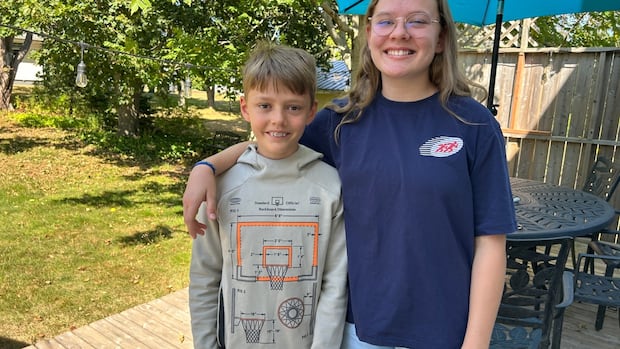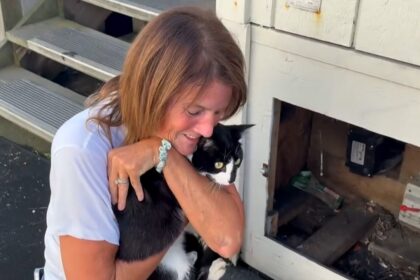PEIWhat should have been a relaxing end to the Labour Day long weekend turned into a nearly catastrophic situation for a Charlottetown family on Monday, because of what is thought to have been a strong North Shore rip current or undertow.Beachgoers saved 3 members of the Bryniarska family on Lakeside Beach MondayRyan McKellop · CBC News · Posted: Sep 02, 2025 7:00 PM EDT | Last Updated: 2 hours agoP.E.I. family narrowly escapes drowning as conditions at Lakeside Beach prove dangerousA Charlottetown family had a scary incident at Lakeside Beach on Labour Day. Izabela Bryniarska (pictured) says they were enjoying the unsupervised beach until what’s thought to be an undertow started to pull her two kids out to sea. Luckily, as CBC’s Tony Davis explains, help was close at hand.What should have been a relaxing end to the Labour Day long weekend turned into a nearly catastrophic situation for a Prince Edward Island family on Monday, because of what is thought to have been a strong North Shore rip current or undertow.Izabela Bryniarska brought her son Léo Barrière, 11, and daughter Maya Barrière, 14, to Lakeside Beach for a swim.It’s not a supervised beach with lifeguards, but the family had been branching out to some lesser-known locations, said Bryniarska, who is originally from Poland. This was their second time at Lakeside, just east of Crowbush Cove. “We were trying to explore and we were pretty happy with this discovery,” she said on Tuesday. “Now, it is a gorgeous beach, but the problem is I don’t have the background, not being from here, to know what to look for in terms of potential risks.”Léo Barrière, 11, and Maya Barrière, 14, are safe at their Charlottetown home again after a Labour Day beach trip nearly ended in catastrophe. (Tony Davis/CBC)Bryniarska said the water looked no different than the last time she’d been there, possibly even “less chaotic” than the previous visit, given the way the waves were moving. So she sat down to send a message on her phone while her kids went into the water, planning to join them in a bit. “I put my phone down in the holder on my chair and I looked up — and all of a sudden, the kids seemed just way further out than I thought they might be, and immediately something kind of wasn’t right to me.”‘Swept out quickly’At that point, Maya and Léo still seemed to be having fun. They tend to swim a bit further out at beaches, as a rule. But the pair soon realized they had gone further than usual.”The more we swam away from the beach, the more I noticed… we are being, like, swept out quickly, and more quickly than… we’re actually swimming,” said Maya.That’s when she looked back and noticed how far from the beach they were. The sister and brother decided to start to swim back to shore, but within minutes, they realized they hadn’t gotten anywhere.The water looked a lot calmer Tuesday off Lakeside Beach, an unsupervised beach just east of Crowbush Cove, but North Shore looks can be deceiving. (Tony Davis/CBC)”I swim quickly, and the fact I wasn’t moving meant that the waves are strong enough to just, like, hold me in place,” said Maya. Maya said her brother was facing upwards, trying to breathe.”I reached my hand out to my brother and he grabbed it… and I realized, ‘This is the part where I hold him up. Why is it so hard to hold him up?'” she said.Feeling “kind of useless,” she soon realized: “I can’t really do anything. And I’m dragging myself down as well.”That’s when Maya decided she had to let go of Léo’s hand, in order to try to attract help for him. Otherwise, she was thinking, both of them would drown.Jim Soutar and Amanda Hamel were at Lakeside Beach when three members of the Bryniarska family got caught up in strong ocean currents. Hamel says not trying to rescue them was not an option for the pair. (Kerry Campbell/CBC)”So I left him. I went to swim as fast as I could on top of the waves.”That’s when Maya saw her “ray of hope,” a man in the water, and she started screaming out for help over the roar of the crashing waves.Léo said he was almost close to giving up by then: “I couldn’t move. And then I heard someone’s voice, so I was like, ‘I might be saved.'”As the man went to help her brother, Maya was relieved, though quickly she remembered she needed to get back to shore as well.Mother trying to help nearly sucked underMeanwhile, Bryniarska had heard the commotion and rushed into the water to help her kids. Soon she too was in a dangerous situation, though she could see that Léo had gotten help.’I don’t have the background, not being from here, to know what to look for in terms of potential risks,’ says Izabela Bryniarska in the wake of Monday’s scare. (Tony Davis/CBC)”Only when I knew they were safe did I realize that I was feeling myself being literally sucked under,” Bryniarska said.She screamed to attract attention and was trying to swim parallel to the shore, following the advice for dealing with a rip current. Luckily, help was at hand. They were struggling, so we went to help.– Amanda HamelJim Soutar and Amanda Hamel were among the beachgoers who dove in to save the family and get them safely back to shore.”There was a point, though, where the crashing waves coming in… we were tired from trying to fight through them,” Soutar recalled in an interview on Tuesday.”You get to a point where the waves are crashing [and] you get a couple gulps of sea water, and you start to realize, ‘Oh, this is really serious for everybody here.'”Hamel said there were others who were in the water as well, and not going to save the other two women who were in trouble was not an option. “They would have been the same age as our oldest, and they were struggling, so we went to help.”More help was arriving on shore in the meantime. Island EMS personnel and firefighters showed up, and the exhausted family was offered the chance to leave the area by ambulance. After their vital signs were checked, though, they decided to decline.This image illustrates that to escape from a rip current, you should try to swim perpendicular to it until there is less force preventing you from reaching shore safely. (Parks Canada/Government of P.E.I.)Bryniarska has now turned her thoughts to preventing other families from getting into trouble at unsupervised beaches.”I think signage is good, maybe a public awareness campaign in general,” she said. She also thinks information could be handed out at the airport to help tourists and other newcomers to the Island, especially people unfamiliar with ocean tides and currents. ABOUT THE AUTHORRyan McKellop is a graduate of the Holland College Journalism program and a web writer at CBC P.E.I.With files from Tony Davis and Kerry Campbell
‘I’m dragging myself down as well’: Family’s Labour Day beach trip nearly ends in tragedy










